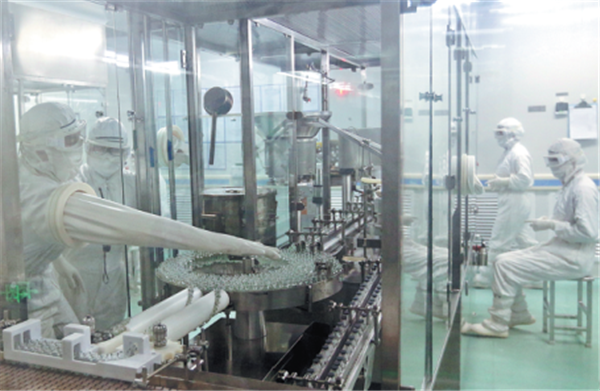Policies released to assist SMEs during disruption

Employees at a medical company in Beijing produce anti-virus drugs in early February, 2020 [Photo by Zou Hong/China Daily]
The Beijing government has released policies supporting rent, tax and financing in early February to reduce the impact of the novel coronavirus outbreak on small and medium-sized enterprises.
Activities have been cancelled and consumption reduced, which creates a challenge for many SMEs.
SMEs are more sensitive to capital costs so when the outbreak affects their operations, they face greater pressure in terms of rent and human resources, according to Tan Xuxiang, director of the Beijing Commission of Development and Reform.
"SMEs account for more than 70 percent of the city's employment. Securing the stable development of SMEs is to secure the livelihoods of people," he said at a news conference on Feb 6, adding most SMEs in Beijing operate in service, retail, transportation, culture and tourism sectors, which play a key role in city operation.
The Beijing government is providing subsidies for rent, daily maintenance costs and product research and development to qualified SMEs, as well as special subsidies to landlords that offer rent reductions to SME tenants.
The policies allow SMEs to apply to delay tax payments for a maximum three months. The policies also encourage banks to offer loans, lower loan interest rates and streamline approval processes. Some administrative charges such as special equipment inspection fees, sewage treatment fees and road-usage fees have also been suspended.
To encourage companies to preserve jobs, the policies allow for the return of unemployment insurance and social insurance expenses for qualified SMEs. They also allocate subsidies for employing laid-off workers.
The city is also offering a notary service and legal consultation for SMEs affected by the epidemic.
According to Wu Sufang, director of the Beijing Bureau of Finance, such policies involve funding of up to 7 billion yuan ($999 million). For the social insurance reimbursement alone, the fiscal investment is about 3 billion yuan, which will benefit about 1.2 million employees, Tan said.
Other preferential policies have been put in place to assist everyday industries. For example, to encourage the normal operation of taxis amid the epidemic, subsidies have been provided to taxi companies reducing taxi rental charges for taxi drivers who continue to work. Rental subsidies for catering chains, fresh food markets and convenience stores that help to meet the basic demand of people during the outbreak have also been increased.
"The policies are expected to benefit more individuals and families while contributing to the overall operation of the city. They also aim to support the stable and healthy development of SMEs in these important and difficult times," Tan said.
Chen Wen, a financial expert from Southwestern University of Finance And Economics, told The Beijing News the policies will help ease the burden on SMEs, guarantee their operation and meet the need of both the real economy and people's livelihoods.

 Responsibilities of the SOCAAC
Responsibilities of the SOCAAC Experiencing Beijing 2023
Experiencing Beijing 2023